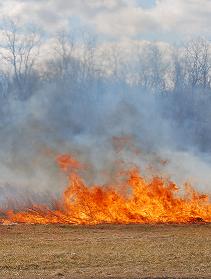Professor David Lindenmayer of the Fenner School of Environment and Society challenges current fire protection practices in the March issue of Australasian Science magazine.
"Much discussion focuses on how to best protect human lives and built assets," Professor Lindenmayer writes. "But management also needs to counter the effects of past forestry activities on fire regimes.
"A prominent question is how much fuel or hazard reduction burning is needed to reduce risk. However, widespread fuel reduction burning is not an option in Australia's moist forests and rainforests as they are generally too wet to burn in a controlled manner. Conversely, past forest management, particularly logging operations, may have significantly increased the fire risk.
"Research in tropical rainforests suggests that logging reduces the number of dry days needed to make a forest combustible from 30 to less than eight days. Logging also alters the density and spatial pattern of trees, the spacing between crowns, and other forest attributes in ways that increase their susceptibility to fire. In moist forests in south-eastern Australia, logging has shifted the vegetation toward a composition that is more characteristic of drier forests that tend to be more fire-prone.
"Clear felling of moist forests in southern Australia has produced dense stands of regrowth saplings, thereby creating more available fuel than if the forest was not clearfelled. Furthermore, debris from logging can also sustain fires longer than fuels in uncut forest, while roads required for logging increase the number of ignition points for wildfires and lightning strikes are more likely in logged areas due to logging slash."
Prof Lindenmayer concludes that fire management "will become increasingly important with rapid climate change," and advocates "creating extensive buffer areas that exclude logging near human settlements within landscapes dominated by moist forest… [and] from areas where human disturbances (like timber harvesting) have been limited, such as the old growth wet forests in Tasmania and eastern Victoria."














